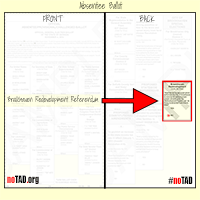#noTAD
Letter to the Editor: Brookhaven does not need Redevelopment Powers
This referendum will appear on the ballots of Brookhaven voters and asks if voters want to
allow "the City of Brookhaven to exercise all redevelopment powers allowed under the ‘Redevelopment Powers Law.'"
Our group strongly believes that our young city will be best served by voting NO.
Read more at The Brookhaven Post
What are some of the advantages and disadvantages of TADs?
TADs offer a flexible alternative to financing economic development without the need to use general funds, LOST or SPLOST revenues or to raise taxes. While there can be significant benefits to using TADs, cities should also be aware of the risks associated with this tool, including the possibility that the TAD area may not generate the level of revenues that the city originally estimated. However, if used carefully, TADs can be an excellent way to finance economic development in cities.
Source: Georgia Municipal Association: Tax Allocation Districts Q&A
What can TAD funds be used for?
In Georgia, TAD funds can be used for grants for capital costs, which includes:
- new construction;
- public works or improvements;
- renovation, rehabilitation, demolition, or expansion of existing buildings;
- acquisition of equipment; and
- clearing land.
TAD funds must be spent on uses approved by City Council and limited to projects that would not be economically feasible without public subsidy.
Adapted from: Invest Atlanta: Tax Allocation Districts Frequently Asked Questions
Who manages TAD funds?
A redevelopment agency, created by City Council, controls TAD accounts.
Quote from City Council Candidate John Park
"Strongest opponent of TAD referendum that would enrich city-connected developers."
- John Park,
District 2 City Council Candidate
Quote from City Council Candidate Tim Nama
"Redevelopment Powers are a give away of our taxpayer dollars to private developers. It is wrong and I am squarely opposed to it."
- Tim Nama, District 2 City Council Candidate
News Alerts
November 2, 2014 | Who is playing dirty politics?
Although the Brookhaven-Peachtree Community Alliance (BPCA) has no position on the redevelopment powers referendum,
they report on their website that "an unknown group
calling themselves 'Citizens for a Better Brookhaven' causes confusion on
this front [by its similarity to] BPCA’s website 'abetterbrookhaven.org'
[and mis-quoting] Jack Honderd ... as a 'spokesman' for the BPCA."
The BPCA goes on to say it is "troubling that this flyer would appear
in our young city already struggling with transparency and citizen distrust.
While much of the information is useful, the inaccuracies suggest
it is campaign literature put together by political tricksters." (emphasis added)
Read more at "A Better Brookhaven"
November 1, 2014 | noTAD endorses John Park for District 2 Councilperson.
noTAD appreciates that both candidates for District 2 Councilperson have voiced their opposition to the Brookhaven Redevelopment question but believe that John Park's views are more closely aligned with ours. Although we agree with Tima Nama that Brookhaven has "too many unfulfilled promises," we do not agree that "[t]here may be a time in the future when Redevelopment Powers could benefit our city."
We agree with John Park that our neighborhoods are not in a "deteriorating area" and as such the use of TADs is wholly inappropriate both now, and in the future, for Brookhaven.
What is a TAD?
A tax-allocation district (TAD), is an area where property taxes above a certain threshold are allocated for a specific project. These projects are typically for revitalization and redevelopment efforts.
Tax-allocation districts have attracted criticism as being subsidies for politically-connected developers. Some cities have discontinued their use but citizens in those cities will be paying off the debt from those tax-allocation districts for years to come.
In Georgia, TAD legislation is described in OCGA §36-44-5.
Note:
General Criticism of TADs
- TADs subsidize big-box retailers to the detriment of independent businesses.
- Large retailers profit disproportionally - several billion dollars since the late 1990s.
- TADs often result in gentrification.
- TADs have been used to designate areas as "blighted" and condemn private property through eminent domain powers.
- The TAD process arguably offers advantages to politically connected developers, builders, and lawyers.
- Some cities using TADs have found that local school quality deteriorates.
- The use of TADs for residential development results in increases in public service expenses.
- With multiple TADs in the same region, there can be a race to the bottom as cities compete with each other to attract new businesses.
- There is insufficient accountability of project feasability. If a project fails the developers still benefit increasing the likelihood of project failure.
- Governmental subsidy of retail development is economically damaging.
Sources:
- "Redevelopment: The unknown government"
- "Subsidizing Redevelopment in California"
- "Greenfields, and Sprawl: How an Incentive Created to Alleviate Slums Has Come to Subsidize Upscale Malls and New Urbanist Developments"
- Don't Subsidize Big Boxes at Local Shops Expense
- Fishing for Taxpayer Cash: Bass Pro's Record of Big-League Subsidies, Failed Promises, and Consequences
- Wal-Mart Subsidy Watch
- Big Tax Breaks for Big Boxes
- Reforming Tax Increment Financing (TIF)
Specific Criticism of TADs for Brookhaven, Georgia
- Brookhaven residents are already on the hook for costly errors made by the City Council and staff.
- If redevelopment projects are not profitable, the citizens will be responsible for the debt, not the developers who stand to profit from any success.
- The Brookhaven City Council has repeatedly shown a willingness to ignore constituents.
- Developers have little risk with high potential for reward.
- The City Council has adopted a moral code which is not reflected by its citizenry.
- The City of Brookhaven is ill-prepared to make the fiscal and public policy decisions necessary to properly manage TADs.
- Many of the touted advantages of cityhood have been empty promises.
- The City Council would choose who will run the redevelopment agency responsible for managing TAD funds, leaving those funds to the discretion of unelected political appointeees.
- Brookhaven has demonstrated a willingness to support developers and builders regardless of the environmental impact.
- Brookhaven has no economic need for TADs.
Tax-allocation districts (TADs) and Tax increment financing (TIF) Exemplars
- St Louis, Missouri declared the West County Shopping Center "blighted" and provided $30 million to build a new mall.
- Chicago saw 30 percent of the money earned by the district over 24 years go to politically connected developers and allies in the final 12 months of the tax district rather than to the schools and parks.
- West Des Moines, Iowa provided $60 million to fund development of a new mall.
- Baraboo, Wisconsin declared a cornfield and an apple orchard "blighted" in order to make the site available for a Wal-Mart supercenter.
- New Orleans provided $20 million for redevelopment of public housing with a cost of $420,000 per low-income-unit.
- Denver subsidized projects do not contribute to public services, forcing taxpayers in the rest of the city to cover those costs themselves.


Brookhaven Ballot
The Brookhaven Redevelopment question appears on the back of the ballot. To see where it appears on the ballot click below to see the full-size image.

O.C.G.A. § 36-44-5 Power of political subdivision (2014)
(a)
Subject to the limitation of subsection (b) of this Code section, a political subdivision may exercise any powers necessary or convenient to carry out the purposes of this chapter, including, but not limited to, the power to:
(1) Describe the boundaries of one or more redevelopment areas within its area of operation, but any redevelopment area so described shall conform to the definition of a redevelopment area provided by paragraph (7) of Code Section 36-44-3;
(2) Cause redevelopment plans to be prepared, to approve by resolution the plans, and to implement the provisions and effectuate the purposes of the plans;
(3) Create within redevelopment areas tax allocation districts and define the boundaries thereof or designate an entire redevelopment area as a tax allocation district;
(4) Define the boundaries of portions of a redevelopment area or an entire redevelopment area for the implementation of redevelopment plans other than plans calling for the creation of tax allocation districts;
(5) Issue tax allocation bonds;
(6) Deposit moneys into and disburse moneys from the special fund of any tax allocation district;
(7) Enter into and execute any contracts, leases, mortgages, or other agreements, including agreements with bondholders or lenders, determined by the local legislative body to be necessary or convenient to implement the provisions and effectuate the purposes of redevelopment plans. The contracts or agreements may include conditions, restrictions, or covenants which either run with the land or otherwise regulate the use of land;
(8) Acquire and retain or acquire and dispose of property or interests therein for redevelopment purposes or use or dispose of property or interests therein presently owned by the political subdivision for redevelopment purposes; and any disposition of such property or interests therein may be by public or private sale or lease; and
(9) Exercise, for the purposes of this chapter, any powers conferred upon political subdivisions by Chapter 61 of this title, the "Urban Redevelopment Law."
